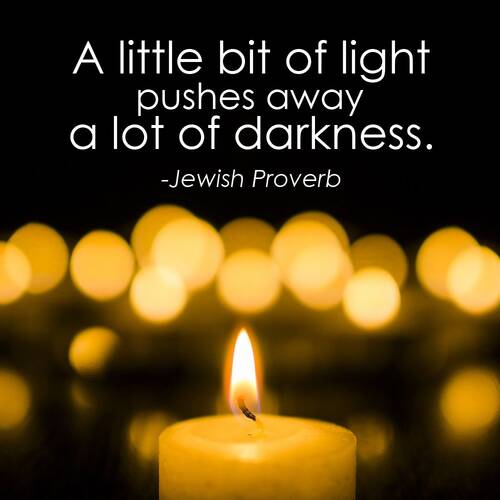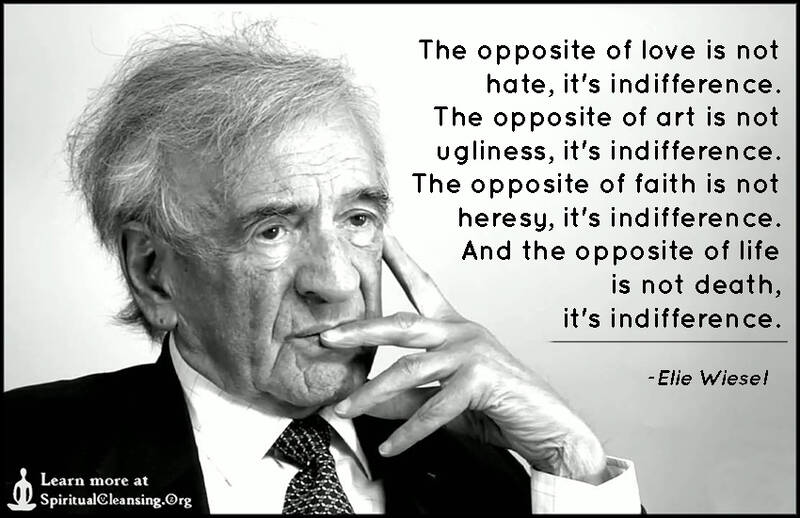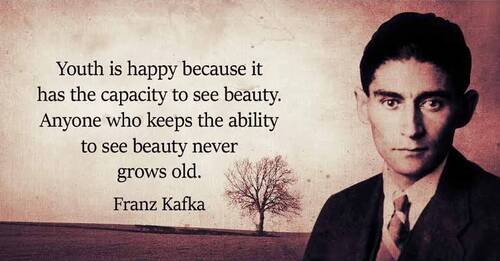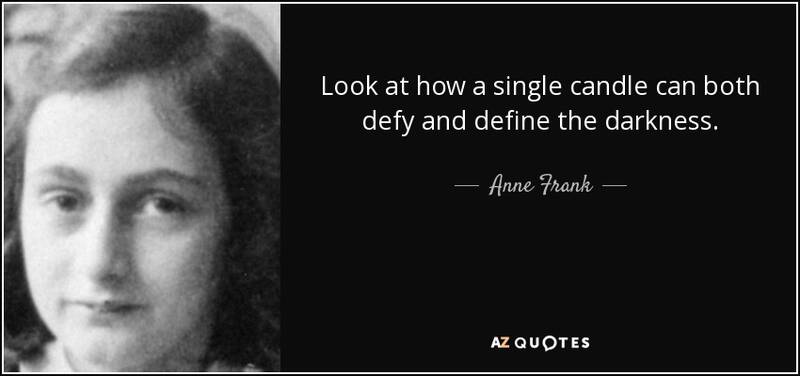Words That Inspire
Words That Inspire
11/4/2022
Dr. Alvin Rosenfeld, professor of English and Jewish Studies at Indiana University speaking about Anti-Semitism originally streamed November 4th, 2022.
6/28/2022
A little bit of light pushes away a lot of darkness. - Jewish Proverb

3/7/2022
Inspiration quote by Anne Frank:
"Look at how a single candle can both defy and define the darkness."
2/17/2022
Inspiration quote by Elie Wiesel:
"The opposite of love is not hate, it's indifference. The opposite of art is not ugliness, it's indifference. The opposite of faith is not heresy, it's indifference. And the opposite of life is not death, it's indifference."

2/1/3/2022:
Inspiration quote by Franz Kafka:
"Youth is happy because it has the capacity to see beauty. Anyone who keeps the ability to see beauty never grows old."

1/19/2022
Inspirational quote by Anne Frank:
"How wonderful it is that nobody need wait a single moment before starting to improve the world."
Diary of a Young Girl is available on Amazon. If you would like a portion of your purchase to benefit KILV, please use smile.amazon.com and follow these easy directions!
6/7/2021
The Tulsa Race Massacre and Oklahoma’s Jews
Click here to read an article about how local Jews - some with fresh memories of European pogroms - did their small part to help victims of one of the worst acts of racial violence in US history
5/19/2021
Jewish Brooklyn: Growing Up
Martin Lemelman, participated in a presentation about growing up in Brooklyn with two other well known artists. Martin lived in Allentown, having taught at Kutztown University, and now resides in Florida, where he has children and grandchildren. He also did the artwork for the Tatooed Torah.
5/11/2021
The Torah scroll of Boskovice finds a new home in Pennsylvania
4/3/2021
The Jewish History of Tootsie Rolls and Other Classic American Candy
In this article you can read about some of the great treats that have a Jewish history, including some local favorites.
3/15/2021
The Orange on the Seder Plate - an Urban Legend
- By Rabbi Robyn Frisch
If you, like me, are past the age of 40, you may remember years ago hearing the claim that Little Mikey of LIFE cereal fame died from the explosive effects of mixing Pop Rocks candy with soda pop. Or you may have heard that children’s television show host Mr. Rogers (Fred Rodgers) always wore long-sleeved shirts and sweaters on his show to conceal the tattoos on his arms he obtained while serving in the military. Or perhaps you’ve heard that alligators live under the New York City sewer system. But, in reality, none of these stories are true. They’re all “urban legends.” And I’m proud to say that I never believed any of them (well, except the one about Mikey and Pop Rocks—I did believe that one for awhile…).
But there’s another urban legend, one connected to the Passover seder, that I’ve believed for years. In fact, I’ve told this story many times at my own seders. It’s the story of the “orange on the seder plate.” And until this week, I always thought the story I told was true—after all, I’d heard it so many times, and read it in so many different places.
The story goes something like this: Professor Susannah Heschel was giving a lecture in Miami Beach, when a man stood up and yelled: “A woman belongs on a bimah like an orange belongs on a seder plate.” In order to show that women DO belong on the bimah—that women have the right to a place in Jewish ritual and in Jewish leadership—Heschel and others began to place oranges on their seder plates. (According to another version of the story, the man yelled: “A woman belongs on the bimah like a piece of bread belongs on the seder plate.” Wanting to make a point about women’s rightful place in Judaism, but not wanting to place bread, which is forbidden on Passover, on her seder plate, Heschel replaced “bread” with “an orange,” since the incident took place in Florida, “The Orange State.”)
I learned the story of “the orange on the seder plate” sometime in the late 1990s, when I was a rabbinical student. At the time I was in my early 30s, hosting my own seders for the first time. Like many of my colleagues, I strived to make my seders authentic, relevant and meaningful by balancing tradition with creativity and innovation. I embraced the traditional symbols of the seder (the four cups of wine, matzah, egg, parsley, etc.) and also newer symbols, such as Miriam’s Cup and the orange. For the past 15 years or so, when I’ve gone to the produce store to buy parsley, horseradish and apples and nuts for my charoset, I’ve made sure to purchase an orange for my seder plate as well. And at every seder I’ve hosted, I’ve shared the “story of the orange on the seder plate” and how it represents women’s equality in Judaism.
But recently I found out that the story I’ve been telling simply isn’t true. Here’s the TRUE STORY, in Professor Susannah Heschel’s own words, from an article that she wrote for The Jewish Daily Forward in 2013:
“At an early point in the seder… I asked each person to take a segment of the orange, make the blessing over fruit and eat the segment in recognition of gay and lesbian Jews and of widows, orphans, Jews who are adopted and all others who sometimes feel marginalized in the Jewish community.
“When we eat that orange segment, we spit out the seeds to repudiate homophobia and we recognize that in a whole orange, each segment sticks together. Oranges are sweet and juicy and remind us of the fruitfulness of gay and lesbian Jews and of the homosociality that has been such an important part of Jewish experience, whether of men in yeshivas or of women in the Ezrat Nashim.”
Heschel went on to write of the Miami Beach lecture urban legend:
“That incident never happened! Instead, my custom had fallen victim to a folktale process in which my original intention was subverted. My idea of the orange was attributed to a man, and my goal of affirming lesbians and gay men was erased.
“Moreover, the power of the custom was subverted: By now, women are on the bimah, so there is no great political courage in eating an orange, because women ought to be on the bimah.
“For years, I have known about women whose scientific discoveries were attributed to men, or who had to publish their work under a male pseudonym. That it happened to me makes me realize all the more how important it is to recognize how deep and strong patriarchy remains, and how important it is for us to celebrate the contributions of gay and lesbian Jews, and all those who need to be liberated from marginality to centrality. And Passover is the right moment to ensure freedom for all Jews.”
I’m glad to have finally learned the “true story” of “the orange on the seder plate.” And now that I know it, will I still put an orange on MY seder plate this Passover? I sure will! But, like Professor Heschel, I’ll invite each of the participants at my seder to take a segment of the orange, make the blessing over fruit that grows on trees and eat the segment in recognition of gay and lesbian Jews and of widows, orphans, Jews who are adopted, interfaith couples and families and all others who sometimes feel marginalized in the Jewish community.
After all, the Passover seder is very much a time for asking questions (for the importance of questions in the Passover seder—beyond the “Four Questions”—see my blog from last year about the seder). And if I’ve learned anything from discovering the truth about the urban legend of the “orange on the seder plate,” it’s that we need to constantly be questioning: even those things that we’re confident we already “know.” ----By Rabbi Robyn Frisch Source: InterfaithFamily.com (via Haggadot.com)
1/26/2021
From the beautiful poem by Amanda Gorman as read at the Inauguration
When day comes we ask ourselves,
where can we find light in this never-ending shade?
The loss we carry,
a sea we must wade
We've braved the belly of the beast
We've learned that quiet isn't always peace
And the norms and notions
of what just is
Isn't always just-ice
And yet the dawn is ours
before we knew it
Somehow we do it
Somehow we've weathered and witnessed
a nation that isn't broken
but simply unfinished
We the successors of a country and a time
Where a skinny Black girl
descended from slaves and raised by a single mother
can dream of becoming president
only to find herself reciting for one
And yes we are far from polished
far from pristine
but that doesn't mean we are
striving to form a union that is perfect
We are striving to forge a union with purpose
To compose a country committed to all cultures, colors, characters and
conditions of man
And so we lift our gazes not to what stands between us
but what stands before us
We close the divide because we know, to put our future first,
we must first put our differences aside
We lay down our arms
so we can reach out our arms
to one another
We seek harm to none and harmony for all
Let the globe, if nothing else, say this is true:
That even as we grieved, we grew
That even as we hurt, we hoped
That even as we tired, we tried
That we'll forever be tied together, victorious
Not because we will never again know defeat
but because we will never again sow division
Scripture tells us to envision
that everyone shall sit under their own vine and fig tree
And no one shall make them afraid
If we're to live up to our own time
Then victory won't lie in the blade
But in all the bridges we've made
That is the promise to glade
The hill we climb
If only we dare
It's because being American is more than a pride we inherit,
it's the past we step into
and how we repair it
We've seen a force that would shatter our nation
rather than share it
Would destroy our country if it meant delaying democracy
And this effort very nearly succeeded
But while democracy can be periodically delayed
it can never be permanently defeated
In this truth
in this faith we trust
For while we have our eyes on the future
history has its eyes on us
This is the era of just redemption
We feared at its inception
We did not feel prepared to be the heirs
of such a terrifying hour
but within it we found the power
to author a new chapter
To offer hope and laughter to ourselves
So while once we asked,
how could we possibly prevail over catastrophe?
Now we assert
How could catastrophe possibly prevail over us?
We will not march back to what was
but move to what shall be
A country that is bruised but whole,
benevolent but bold,
fierce and free
We will not be turned around
or interrupted by intimidation
because we know our inaction and inertia
will be the inheritance of the next generation
Our blunders become their burdens
But one thing is certain:
If we merge mercy with might,
and might with right,
then love becomes our legacy
and change our children's birthright
So let us leave behind a country
better than the one we were left with
Every breath from my bronze-pounded chest,
we will raise this wounded world into a wondrous one
We will rise from the gold-limbed hills of the west,
we will rise from the windswept northeast
where our forefathers first realized revolution
We will rise from the lake-rimmed cities of the midwestern states,
we will rise from the sunbaked south
We will rebuild, reconcile and recover
and every known nook of our nation and
every corner called our country,
our people diverse and beautiful will emerge,
battered and beautiful
When day comes we step out of the shade,
aflame and unafraid
The new dawn blooms as we free it
For there is always light,
if only we're brave enough to see it
If only we're brave enough to be it
1/12/2021
Love from the Eyes of a Child
in these troubled times.. there is hope among us..
A group of professional people posed this question to a group of 4 to 8 year-olds, 'What does love mean?' The answers they got were broader, deeper, and more profound than anyone could have ever imagined!
'When my grandmother got arthritis, she couldn't bend over and paint her toenails anymore... So my grandfather does it for her all the time, even when his hands got arthritis too. That's love.' Rebecca - age 8
'When someone loves you, the way they say your name is different. You just know that your name is safe in their mouth.' Billy - age 4
'Love is when a girl puts on perfume and a boy puts on shaving cologne and they go out and smell each other.' Karl - age 5
'Love is when you go out to eat and give somebody most of your French fries without making them give you any of theirs.' Chrissy - age 6
'Love is what makes you smile when you're tired.' Terri - age 4
'Love is when my mommy makes coffee for my daddy and she takes a sip before giving it to him, to make sure the taste is OK.' Danny - age 8
'Love is what's in the room with you at Christmas if you stop opening presents and just listen.' Bobby - age 7 (Wow!)
'If you want to learn to love better, you should start with a friend who you hate.' Nikka - age 6
(we need a few million more Nikka's on this planet)
'Love is when you tell a guy you like his shirt, then he wears it every day.' Noelle - age 7
'Love is like a little old woman and a little old man who are still friends even after they know each other so well.' Tommy - age 6
'During my piano recital, I was on a stage and I was scared. I looked at all the people watching me and saw my daddy waving and smiling.
He was the only one doing that. I wasn't scared anymore.' Cindy - age 8
'My mommy loves me more than anybody. You don't see anyone else kissing me to sleep at night.' Clare - age 6
'Love is when Mommy gives Daddy the best piece of chicken.' Elaine - age 5
'Love is when Mommy sees Daddy smelly and sweaty and still says he is handsomer than Robert Redford.' Chris - age 7
'Love is when your puppy licks your face even after you left him alone all day.' Mary Ann - age 4
'I know my older sister loves me because she gives me all her old clothes and has to go out and buy new ones.' Lauren - age 4
'When you love somebody, your eyelashes go up and down and little stars come out of you.' (what an image!) Karen - age 7
'Love is when Mommy sees Daddy on the toilet and she doesn't think it's gross...' Mark - age 6
'You really shouldn't say 'I love you' unless you mean it. But if you mean it, you should say it a lot. People forget.' Jessica - age 8
And the final one: The winner was a four year old child whose next door neighbor was an elderly gentleman who had recently lost his wife. Upon seeing the man cry, the little boy went into the old gentleman's yard, climbed onto his lap, and just sat there. When his mother asked what he had said to the neighbor, the little boy said, 'Nothing, I just helped him cry.'
1/5/2021
This fills my heart with pride... As Moses led our people out of bondage, these scientists are going to lead the world out of the pandemic. Feeling good about the info below, I thought you might be interested:
Mikael Dolsten, Chief Scientific Officer at Pfizer, is Jewish. He grew up in Halmstad, Sweden, the son of a Jewish father with prewar roots in Sweden and a Jewish mother who escaped Austria in the early days of WWII. He visited Israel several times as a youngster and did a year of his doctoral work at the Weizmann Institute. There he learned cutting-edge immunology which led him to pharmaceutical science. Dolsten has referred in interviews to rising anti-Semitism in Sweden.
Pfizer CEO Albert Borla is a Sephardic Jew from Thessalonika, Greece, a city whose Jewish population was almost completely wiped out during WWII. The Borla family's history in Thessalonika goes back 5 centuries and Borla visits his remaining family members there yearly. He now lives in New York City.
The Chief Medical Officer for Moderna, a Cambridge, Mass.- based company is an Israeli immigrant named Tal Zaks. Previously, he served as head of Global Oncology at Sanofi Pharmaceuticals. Zaks received his M.D. and Ph.D. degrees at Ben Gurion University and conducted post-doc research at the NIH.
The scientist responsible, with a colleague, for the pioneering breakthroughs that allowed the development of an mRNA vaccine (the novel approach used by Moderna and Pfizer for dealing with COVID-19) is University of Pennsylvania's Drew Weissman. A Professor of Medicine at Penn, he received his BA and MA degrees at Brandeis and MD/Microbiology and Ph.D. at Boston U. Weissman once worked with a fellowship at the NIH under Dr. Fauci.
And remember that we are less than 2% of the US population.
Wed, October 15 2025
23 Tishrei 5786





